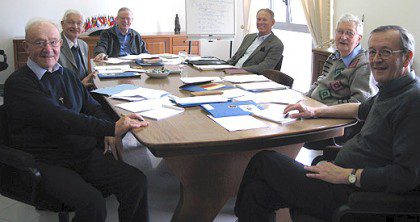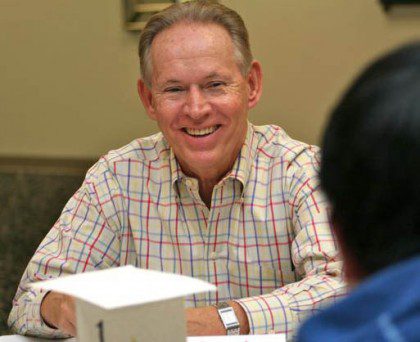
The face of the Priests of the Sacred Heart is changing. After years as a European-centered congregation of priests and brothers, it is rapidly growing in Africa, Asia and South America. Among the three provinces of Brazil there are 73 men in temporary vows, Congo has 32, Cameroon 47. In Indonesia, long a province dominated by Dutch missionaries (several American SCJs have served there as well), there are 37 men in temporary vows and four novices. The new Asian districts of the Philippines and India have 45 young SCJs in temporary vows.
The General Curia and the International College in Rome mirror this new SCJ face. The general secretary is a priest from Indonesia, Fr. Heru Ismadi, SCJ. He succeeds a Brazilian, Fr. Anisio Schwirkowski, SCJ. North America and Europe are represented in the SCJs’ International College, but most of the students –– many preparing for teaching or administrative assignments in their home provinces –– are now from Africa, Asia and South America.
The congregation has much youth; there are many young “sons” of Fr. Dehon.
But there are also a growing number of elderly members of the SCJ family, many of whom paved the way for the current growth in the Southern Hemisphere. And it is not just individuals who are aging, but in some cases, entire provinces. The average age of SCJs in the Dutch-Flemish Confederation –– 121 priests and brothers –– is 78. A few other provinces aren’t too far behind.
It is easy to concentrate on growth, on youth. It was the focus of much of the early years of the congregation.

“When the whole congregation was young and growing we did not need to focus on aging and retirement,” said Fr. Jim Schroeder, SCJ. “All of our efforts were on formation and education, building schools and preparing formators and teachers, starting new ministries and missions.”
Fr. Jim, a member of the U.S. Province, serves on a newly developed Working Group on Aging. The international group of six SCJs, including Fr. John van den Hengel of the General Council, was developed late last year as an advisory body to the general administration. They met for the first time in February.
“What we are looking at are not just the needs and concerns of individual SCJs but also of some provinces where entire populations are aging,” said Fr. John van den Hengel, chairperson of the group.
At 71, Fr. John is the eldest member of the General Council; he said that it wasn’t a coincidence that he was named to head the group.
He emphasized that the working group is not just looking at how to support and care for elderly SCJs. Questions go beyond finances, health care and residential options. They go beyond the immediate needs of seniors today.
“How can we ensure that we –– all SCJs –– are spiritually well cared for in our senior years,” said Fr. John.
“Not much consideration has been given to this ‘third age,’ or third part of our lives as SCJs [the first two being initial formation and active ministry],” said Fr. Jim Schroeder. “There needs to be on-going formation regarding this part of our lives as religious. How can we care for the spiritual and pastoral needs of men who have spent their whole lives providing pastoral care for others?”
The example of Fr. Leo John Dehon was cited. “As all of us do as we age, he had to make adjustments,” said Fr. Jim. “But even with limitations, he continued a vibrant life until the end…
“How can our SCJ spirituality inform and enliven the religious life that we live until death?” he continued. “How can we –– not just those who are elders now, but our young SCJs who will one day be elders themselves –– grow and flourish in parts of our lives while also diminishing in other areas?”
“Sometimes it takes the experience of old age to force one to get to the core of who he is as a spiritual being,” said Fr. John van den Hengel. “We tend to strongly tie our lives to our activities and then can forget that life is not all that much about what we do but more about the worth and goodness that we become in doing.”
Aging provinces
While much of the working group’s initial discussions focused on the individual experience of being a senior, as noted, several provinces as a whole are aging. The most significant example is the Dutch Province, which decided to “end the province in its present form,” said Fr. John. A rapidly graying province that had gone for years without new vocations, Dutch SCJs decided to stop seeking new members.
“A process was developed to allow for this change but there are many issues that were not foreseen,” said Fr. John. “How will we take care of our SCJ communities that no longer have members who have the energy or ability for certain roles in leadership? Dedicated lay people are taking on increased responsibilities but we need to discuss what they can and can’t do in regards to our communities and resources. Can laity serve on our councils? Can they be given the same authority that an SCJ would have?”
“We need to obtain and explore canonical models,” said Fr. Jim Schroeder. “What are the possibilities? Do new models need to be created?”
In the months ahead members of the group will gather demographic information on the SCJ entities and examine policies on aging, retirement, healthcare and other related concerns.
“Our discussions helped me gain an appreciation for what we are doing in the U.S. Province,” said Fr. Jim. “We really are on the forefront in having policies on aging, retirement and healthcare.”
A positive beginning
About the first meeting, Fr. Jim said that “I was very pleased with the vitality, fraternity and creativity of the members of the working group. The six of us ranged in age from 62 to 86, and I was not the youngest! The older members of the group were an inspiration in their intelligence, experience, good humor, energy and stamina.”
Fr. Jim said that it was interesting to learn “how some provinces have found very creative ways of continuing their works, using their large buildings, and caring for their seniors.
“But most importantly, I was very pleased with our discussion of how our senior religious can live our charism unto death. Our Constitutions give us some beautiful counsel: No matter how old or sick an SCJ may be he can live our charism because ‘we are called in the Church to seek and to lead, as the one thing necessary, a life of union with the oblation of Christ’ (N. 26)…
“What our working group, and I believe the general administration, want to foster is what is found in Const. N. 68, which states:
At the heart of the local and provincial community,
we surround with special charity
our sick or aged brothers.
Particularly though them
the Lord inspires us
to authentic abandonment,
and reminds us
of the fragile nature of our condition;
He wants to be acknowledged and served in them
in a very special way (cf. Matt. 25:40).
For their part, these brothers shall accept
the care generously given them
as an expression of the charity of Christ,
who asked His disciples
to accept His most humble service (cf. John 13:8).
